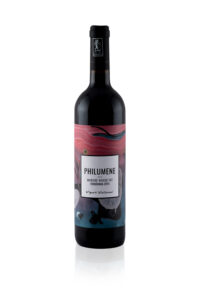You could think of a game among children for the hills between Colli del Tronto and Castorano.
But behind these two simple words hid the command to go hide with the animals at the bottom of the Pescolla ditch, near the vineyard, taking along their sister: she was 9 years old and the younger sister was 8.
It was the time of the Second World War, and it was necessary to preserve the few resources available: the animals and food supplies. Nazi-fascist soldiers would pass by, confiscating wherever they perceived abundance. So, Filomena was tasked with guarding the animals, even for two consecutive days, bringing along food items gathered in a handkerchief. It's unthinkable today to leave two young girls, no matter how close to home, outside at night, all alone.
A brief and necessary introduction to better understand what this woman would become, marked from childhood as the eldest of five daughters, taking on a role that typically fell to eldest sons: experiences and situations that hardened her character because she had to prove herself as capable as a male, while also bearing the responsibilities that traditionally belonged to women at home, such as helping in the kitchen, caring for her younger sisters, and tending to the animals.

Going against the trend even in marriage: usually, daughters who got married moved into the house of their future husbands. Instead, she stayed in her paternal home due to her strong bond with the family, particularly with her father, finding in Livio the ideal partner with whom to build a family.
There is much talk about women's emancipation, about how strong the gender gap in equality still is today: we have had an example of selflessness, of total dedication to the family and to what had been passed down from the father, with all the merits and all the limitations. It is the story of a woman who seemed tough, unyielding, outspoken, but who knew exactly what she wanted and how to command respect, getting straight to the point.
Respect above all else.
With her husband, they worked as sharecroppers, as was common at that time. They managed to redeem those lands with great sacrifices and commitments: a life under the authority of others, and finally becoming the owners of those lands that were their home as far as they knew.
Another anecdote: She was already over 65 years old when she noticed that a neighbor was picking products from the garden without permission. One night, she waited for hours to catch him in the act and, above all, to remind him that if he needed anything, he could have asked, and she would have gladly given it to him. But taking them like that, no: being kind is one thing, being taken advantage of is another. And she had been clear about this since she was a child: being a woman meant having to stay one step behind men. Just as working under masters meant sharing the proceeds of their work in the fields, and the best part of the land or animals always went to the masters.
We're talking about another era that might appear romanticized to some, but rural Italy between the two World Wars and immediately after the Second World War was characterized by men and women who understood the meaning of hard work and endurance. Those who have relatives who lived during that period certainly have stories to tell.
Steadfast to the end, even when grandfather passed away, he maintained reserve and dignity. He suffered, but didn't show it. In his final years, confined to a wheelchair, one day in the cellar while they were preparing the wines for shipment, he watched with absorbed gaze all the work, and as he looked at the bottles with labels, he became emotional: the redemption of a lifetime, of hardships, of hard work, of sacrifices, was realized in the realization that the work that she and her husband, and before her, her father, had done not only had not been lost but had transformed into something that she had never imagined. Since they had bought the property where they had worked as sharecroppers for years and had started selling bulk wine out of necessity, to see bottles with the label Vigneti Vallorani and a barn transformed into what had been the first tasting room, well, it had been quite a journey. And the cellar was still in its infancy.
The love for the genuineness and healthiness of the products that came from their lands stemmed from a very practical awareness: over time, Grandfather Livio and Grandmother Filomena had also started a small shop, and despite selling, among other things, sweets and snacks like many others today, they always gave their grandchildren homemade bread. They would put a drop of oil from their olive groves on it and spread it with their finger, and if we wanted something sweet, they would add tomato with sugar on top. They never gave us snacks because this was their reasoning: "If I bake a cake and it's no longer good in a week, just think about what they must put inside those snacks to make them last for years!"
She extended credit in her shop to those who couldn't afford it, marking it in the ledger, and they would pay at the end of the month. She would recount how, in the post-war period, those who had been their landlords lost many of their assets, perhaps due to wrong investments, and ended up in dire straits, resorting to having their purchases noted in the ledger when they went to grandmother's shop, something she never made them feel bad about. She recounted this as a warning to always remain grounded and never take anything for granted.
She was a woman of few words: if she set a time, it had to be respected. Her children had always obeyed to avoid getting scolded. The grandchildren enjoyed more flexibility, but if grandma set a return time, that had to be it. Rocco tells an anecdote about this: it was summer and hot, and he had agreed to stay out playing with friends until late. Grandma had set midnight as the return time. At that hour, Rocco blissfully played soccer with his friends, but shortly after midnight, he caught sight of grandma's figure standing still, staring at him, holding a vine branch in her hand. From chasing the ball to running home to avoid feeling the sting of the branch on his behind, it was a split-second decision. She didn't need many words.
We couldn't help but dedicate our pure Montepulciano to our grandmother, characterized by 20 days of maceration from old vines with low yields. Produced only in the vintages that we consider most expressive for this type, we let it age for 24 months in small oak vats and all the time necessary in the bottle so that it loses its roughness to reveal itself in its most gentle essence, just like our grandmother. Only a few bottles in total; the vintage being released is the 2015
Impenetrable color, bold sip, rustic, with notes of plum, humus, and fruit in spirit, it's initially a gruff wine, not for everyone but for those who appreciate its gustatory intensity.

It's in its purity that it expresses its elegance: thanks also to the long aging process that frees it from its roughness; impenetrable, it requires the necessary time to oper up and to be understood: we take more time and gradually realize different nuances that allow us to connect and grasp its essence.
It's a wine that requires the necessary time to be understood and appreciated: it's like with people, with some we immediately find ourselves in harmony, like with certain wines that we drink without much thought, perhaps in the end they leave little impression; with others, we might feel almost antipathy at first, only to change our minds later, similar to certain wines that seem closed off, almost undrinkable, but gradually curiosity creeps in to go beyond the initial impression, and there's that little magic of grasping the beauty and depth of nuances, going beyond the surface to reach the fundamental core.
In Greek etymology, the name Filomena (Philumene) has two meanings: faithful friend and friend of strength. In both cases, these concepts perfectly describe both Filomena's character and that of this reserve wine.
On the label "Ombre 10" by Vincenzo Lopardo, a local artist.